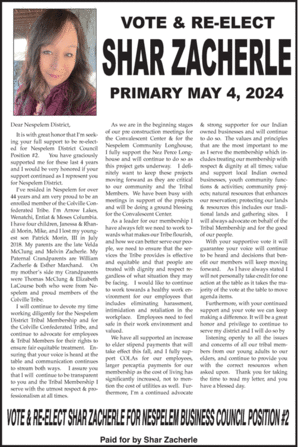Supporting our small businesses by addressing burdensome regulations
Last updated 7/22/2015 at 11:07am
I recently read a news story of an outstanding teenager in Prosser named Walker Orr. Since he was 8 years old, Walker has found innovative ways to offer a service or product in exchange for a reasonable price, from selling varieties of seeds to running a lawn mowing business. Now at the age of just 16, Walker has started a small artisan bread company, Amber Artisan Bread, selling loaves and baguettes at farmers markets in Prosser and Tri-Cities.
How can we as a nation encourage budding entrepreneurs just like Walker and those who work hard running small businesses to earn their own success? By reducing the top-down burden of regulations and increasing accountability for federal regulators.
Small businesses are the backbone of our national and local economy, providing more than half of all private sector American jobs, and almost two-thirds of all new jobs. According to the Small Business Administration, more than 1.2 million Washingtonians are employed by small businesses. While some regulation can create helpful safeguards, more often we see excessive regulation that raises costs for small businesses and gets in the way of job growth.
From my own experience running a farm, I understand firsthand how frustrating compliance with regulations can be. Federal regulations cost small companies $11,000 per employee. According to the National Small Business Association, the compliance cost per business for Obamacare is $15,000 per year, which is just one more reason I voted to repeal that law.
Common sense regulatory reform for small businesses can open opportunities for entrepreneurs who work hard and create jobs. The impact of federal regulations on the ability of small businesses to make a profit is much greater comparatively than on large firms. Earlier this year, I voted for H.R. 527, Small Business Regulatory Flexibility Improvements Act, to require federal bureaucrats to consider the impact on small businesses before they issue new regulations. This bill would create accountability for regulators by requiring them to take into account the economic impact of regulations on small businesses.
I also cosponsored H.R.712, the Sunshine for Regulatory Decrees and Settlements Act, which would prevent the abusive practice known as “sue-and-settle” whereby pro-regulatory plaintiffs collude with federal agencies behind closed doors outside the normal rulemaking process. These suits can result in higher business costs. H.R. 712 would end this backdoor method of increasing federal regulation.
Just this past week, the House also passed H.R. 2499, the Veterans Entrepreneurship Act to permanently waive upfront fees for veterans applying for loans under the Small Business Administration’ Business Guarantee Loan Program. An upfront fee for a $300,000 loan would normally total $9,000, so this legislation adds a boost to those who start small businesses after serving our nation in the military.
One-size-fits-all regulations create mountains of compliance costs and paperwork, creating a frustrating maze for potential job creators. Small business operators should have more say in the regulations that have an outsize impact on them, and reducing the burdens of federal regulations on small businesses should continue to be a top priority for Congress.





Reader Comments(0)